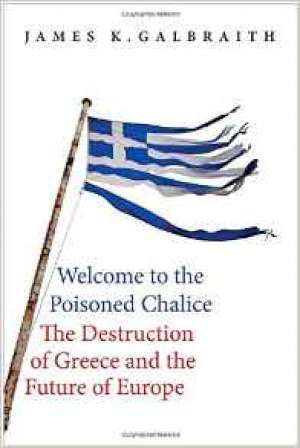09 November 2016
Welcome to the Poisoned Chalice
The Destruction of Greece and the Future of Europe
James K Galbraith
2016, Yale University Press, 224 pages,
ISBN 9780300220445
Reviewer: Vicky Pryce, CEBR Board Member

The title of this book, which consists of articles and memos written mostly during the Greek crisis of 2015, was how the now world-famous, then Finance Minister of Greece,Yanis Varoufakis, greeted the US academic James Galbraith when he arrived in Athens in February 2015. Galbraith acted as a unpaid adviser to help with the debt negotiations with Europe and the IMF . Varoufakis, who had been his colleague at the University of Austin in Texas, had returned to Greece and was suddenly catapulted to the world stage after Syriza was swept to power in January 2015. It is not surprising that what we get here is very much the Varoufakis story, and the book is to a considerable measure a eulogy to the ex-finance minister.
Few people fail to be charmed by Varoufakis as his BBC punditry and 1m twitter followers will attest. But what did he achieve? Unfortunately very little. The protagonists became well known all over the world. The media and everyone I met learned to pronounce the name of the new Greek Prime Minister Tsipras and of Varoufakis with impeccable Greek accents. The day-to-day negotiations with the European creditors and the IMF were reported in the global press and moved markets. But to no avail.
Syriza, a collection of left wing parties, including ex-communists, had won the elections from the previous centre right New Democracy government of Antonis Samaras, promising a complete rethink of the relationship with Europe which had led to six years of austerity and a 25% decline in GDP. As talks stalled over five months of post-election negotiations, and the economy and banking system were on the brink of total collapse and ‘Grexit’ loomed, Tsipras called a referendum in July 2015. He unexpectedly won with more that 60% voting NO to more austerity and the further measures which the ‘troika’ of lenders was trying to impose. Tsipras nevertheless knew that the Greeks did not want to leave the euro, let alone the EU, and was resigned to accepting the conditions despite the vote. Indeed the Syriza referendum posters were urging the population to vote No to Austerity but Yes to Europe. The day after the vote Varoufakis resigned, new elections were held in September and this gave Tsipras, despite the referendum, the mandate to accept the tough measures wholesale.
The result? Greece continues to struggle under the pressure of higher taxes across the board and cuts in pensions and in spending to contain the deficit. Capital controls were imposed to stop capital flight and hundreds of thousands of businesses have closed. Europe has learned no lessons at all, although there is now talk of some look at debt restructuring and possible relief. But the net outcome is that Greece, according to Galbraith, has become a European ‘colony’. And it is not the only one, since countries in the Eurozone now find their fiscal policy being centrally controlled under the Stability and Growth pact.
It is hard to disagree with Galbraith’s analysis. Greece should never have joined the Euro, the euro was/is a construction that mainly benefited Germany. The countries in the periphery, including Spain and Portugal and to some extent Ireland and Italy, all left with huge debts to deal with, have suffered. The Greek ‘rescues’ have not rescued the Greeks from disaster but the German and French banks that were lending Greece too much and were able thus to extricate themselves as painlessly as possible when the crisis hit.
As this book argues, economically the Greeks were seen to be correct in their analysis by their creditors; but politically their pleas had to be ignored. And within all this there were desperate attempts to see a way out, a whole Plan B, worked up by Galbraith and a few trusted others for Varoufakis to revert to the drachma, the original Greek currency if all else failed. This was kept strictly hidden until the secret plans to hack the computers that effected tax transactions within his own Ministry, to allow an easy and quick currency transition, were revealed by Varoufakis himself after his resignation. This happened in a telephone briefing chaired by Norman Lamont, no less, for the think tank OMFIF ; I was one of a select few who listened in too in complete shock and disbelief !
This is a great eye opener of a book for those not closely involved in the Greek crisis. But it demonstrates clearly that Varoufakis, and Galbraith with him, though right on the economic analysis, completely misjudged the politics they were dealing with.
